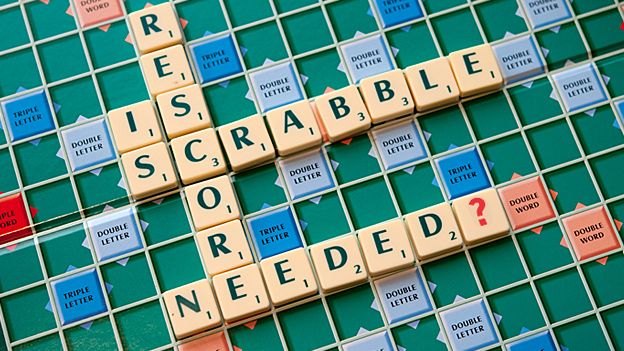Scrabble: Should letter values change?
- Published

The values of the letters in Scrabble were assigned according to the front page of a US newspaper in the 1930s. Is it time the scoring system was updated to reflect today's usage?
All Scrabble players know that Q and Z are the highest scoring tiles. You can get 10 points for each, in the English language version of the game.
But according to one American researcher, Z really only deserves six points.
And it's not just Z that's under fire. After 75 years of Scrabble, some argue that the current tile values are out of date as certain letters have become more common than they used to be.
"The dictionary of legal words in Scrabble has changed," says Joshua Lewis, researcher and creator of a software program which allocates new, up-to-date values to Scrabble tiles.
"Among the notable additions are all of these short words which make it easier to play Z, Q and X, so even though Q and Z are the highest value letters in Scrabble, they are now much easier to play."
Joshua Lewis's program is called Valett and it recalculates the letter valuations by looking at three things.
Firstly, there is the frequency of the letters in the English language. Secondly, the frequency by word length - how many times a letter appears in two, three, seven, and eight-letter words.
And finally, he looked at how easy it is to play the letter with other letters. For example, Q is a difficult letter to play so would warrant a higher score than S, which can be played with many more.
According to Lewis's system, X (worth eight points in the current game) is worth only five points and Z (worth 10 points now) is worth six points.
Other letter values change too, but less radically. For example, U (one point currently) is worth two in the new version, G (two points) becomes three and M (three points) becomes two.
What's your favourite word worth?
Type in a word to find out if the score has changed
Not all letters change under these proposals but those that do tend to have fallen in value. In explaining why his overall point distribution is lower, Lewis blames Q which, as he puts it, is an "outlier", much harder to play than other letters.
"You get this justified separation between Q at 10 and Z and J at six, and in general the non-Q letters are a bit more compressed in value."
He looked at increasing the value of Q to 12, but decided against putting too much power in a single tile.
Lewis is not the first to propose an updated version of Scrabble, says John Chew, co-president of the North American Scrabble Players Association. He says he hears from people once or twice a year saying that the tile values are incorrect.
In fact this has been happening ever since the game was invented in 1938 by the American architect Alfred Butts, who calculated a value for each tile by measuring how frequently each letter appeared on the front page of the New York Times.
"Alfred Butts had a selection bias in favour of printed newspaper English which many people have suggested ought to be rectified," says Chew.
But is there a market for a revised version of Scrabble?
If the tile values changed there would be "catastrophic outrage", says Chew.
"Some people would just continue playing with the old tile distributions because people who've played the game often enough tend to remember that the Q is worth 10 points, the Z is worth 10 points and so on."
What's more, he says, seasoned Scrabble players know there is an important difference between the value written on a Scrabble tile and that tile's real value when played in a game, a notion he calls "equity value". So a blank tile or an S have an equity value that far outstrips their face value because they can easily earn a player so many points.
So could Scrabble tiles really be changed to adapt to our evolving vocabulary?
No, according to Mattel, the company which manufactures Scrabble in Europe.
"Mattel has no plans to change Scrabble tiles. It is not a game where fairness is paramount, it is a game of luck and changing the tile values wouldn't achieve anything," says Philip Nelkon, Scrabble's UK representative.
Even Joshua Lewis, inventor of the new system believes the traditional valuations can make the game more exciting.
"You're really lucky if you pick an X because it's over-valued and unlucky if you pick a V. So if they were to re-do the values of the tiles that would reduce the level of luck.
"That might be desirable in tournaments but it might not be as good in casual play where you want the less skilled players to have a shot periodically at beating the more highly skilled players."
So those players who rely on good luck when playing Scrabble can breathe a sigh of relief.